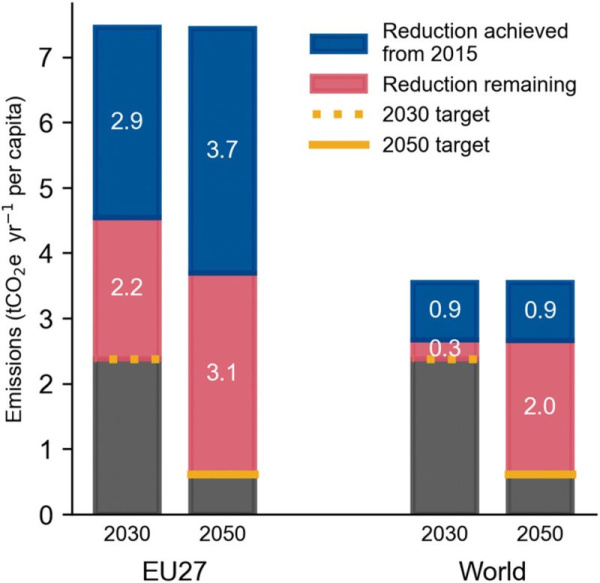
We are excited to announce the publication of a groundbreaking research paper as part of the EU 1.5° Lifestyles project. As part of her PhD research, Stephanie Cap projected household carbon footprints into the future under an optimistic industrial decarbonization scenario, excluding lifestyle changes. The findings demonstrate significant reductions in household carbon footprints, yet underscore their insufficiency in meeting the 1.5°C target. Achieving this goal necessitates a concurrent shift in lifestyles.
Authored by Stephanie Cap, Arjan de Koning, Arnold Tukker, and Laura Scherer, the paper is titled "(In)Sufficiency of industrial decarbonization to reduce household carbon footprints to 1.5°C-compatible levels" and it delves into the crucial intersection of technological advancements and lifestyle changes in mitigating climate change.
To stay below 1.5°C, technological change alone is not enough.
The paper examines scenarios aimed at limiting global warming to 1.5°C, focusing on the often-overlooked aspect of lifestyle changes versus technological advancements. The scenario model, based on a global supply-use table from EXIOBASE, projects the evolution of household footprints in 2030 and 2050, with a special focus on the EU27 countries. The findings reveal that while technological change can significantly reduce emissions, it falls short of achieving the 1.5°C target. By 2030, eight EXIOBASE regions, including three EU27 countries, showcase a 1.5°C-consistent trajectory solely through technological advancements. However, by 2050, no country is projected to meet the 1.5°C-compatible target.
The Urgency of Lifestyle Transformation
The average EU27 overshoot for household footprints approaches 2.2 tCO2e/cap in 2030 and 3.1 tCO2e/cap in 2050, underlining the critical role of lifestyle transformation. Global overshoots are comparatively more moderate, emphasizing the need for a holistic approach. These results underscore the urgency for a paradigm shift in household lifestyles to achieve climate change mitigation goals outlined in the Paris Agreement.
The research not only highlights the insufficiency of relying solely on technological change but also points towards the necessity of diverse lifestyle change pathways.
Access the Full Paper Here: Link to the Paper
Stay connected for further updates from the EU 1.5° Lifestyles project, for example through our Newsletter, to stay informed about the latest research outcomes.

